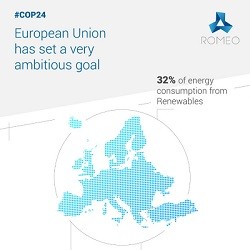ROMEO Project against climate change
The 2018 UN climate change conference (COP24) will be held in the Polish city of Katowice from 2 to 14 December 2018. The key objective of COP24 is to adopt the implementation guidelines of the Paris Climate Change Agreement. In this sense, this Summit will be key when it comes to designing the instruments that enable climate goals to be tackled and achieved effectively and efficiently. Nowadays, climate change is an undeniable fact: the concentration of greenhouse gases (GHGs) in the atmosphere has been progressively increasing since the Industrial Revolution and reversing this trend is only achievable via worldwide action and by tackling the problem forcefully from all angles. In Europe, offshore wind power emerges as one of the sources of energy that presents greater growth potential to achieve the renewable and climate policies of the EU. Offshore wind is reaching highly competitive levels becoming a relevant part of the power system: wind represents a significant future opportunity: resources are stable, abundant and public acceptance is higher. In this context, the ROMEO project plays a very important role. ROMEO is fully aligned with the European climate change strategies, energy security of supply and economic competitiveness through a transformation of the energy system, with far reaching implications on how we source and produce our energy, how we transport and trade it, and how we use it. The vision is to reduce carbon dioxide (CO2) emissions from the EU by at least 80-95% by 2050 compared to the 1990 levels. In addition, the ROMEO project wants to contribute to accomplishing climate change policies by achieving the 32% of energy consumption from Renewables and at least 40% cut in greenhouse gases emissions by 2030. In this context, fuels wind energy is an attractive alternative to fossil. It is plentiful, renewable, widely distributed, clean and produces no greenhouse gases emissions during their operation. In the wind energy sector, it takes a turbine just three to six months to produce the amount of energy that goes into its manufacture, installation, operation, maintenance and decommissioning after its 20-25 year lifetime. During its lifetime a wind turbine delivers up to 80 times more energy than is used in its production, maintenance and scrapping. Wind energy has the lowest ‘lifecycle emissions’ of all energy production technologies (Source: EWEA) About COP24 As part of its programme designed to meet this crucial challenge, the United Nations Framework Convention on Climate Change (UNFCCC) annually holds a Conference of the Parties (COP) attended by around 200 countries. The COP is the most important worldwide initiative aimed at reducing greenhouse gases (GHGs) emissions and slowing global warming. The main objectives of COP24 are: To take the decisions necessary to ensure the full implementation of the Paris Agreement. To take stock of the collective achievements made by the Parties in their efforts to meet the objectives agreed in Paris. As far as Poland, the host country, is concerned, its aim is to show all the other countries how they can become carbon neutral thanks to sound forest management.
Countries
Austria, Switzerland, Germany, Denmark, Spain, France, United Kingdom



